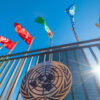Securing the future of global health through unified messaging
Reflections from our 2025 Global Health Moments event – Part 2
In June 2025, we brought together global health communications professionals in Geneva for a Global Health Moments event, Rethinking Communications in Uncertain Times. The shifting dynamics of the global health sector were central to the discussions, as also highlighted in our previous blog post. One challenge in particular was discussed in depth: how can the global health community work together to restore urgency, legitimacy, and relevance in this new context?
Progress worth protecting
Over the past two decades, global health institutions have saved millions of lives. USAID-supported programmes alone have prevented more than 91 million deaths, including 35 million children under five. Mortality from HIV/AIDS, malaria, and neglected tropical diseases has fallen sharply. Global health organisations have helped transform health systems and build resilience in low-resource settings.
Yet despite this clear impact, global health is facing disruption. The reason lies not in the results, but in the changing political landscape. As focus moves away from multilateralism, the collective case for global health is losing traction, and with it, crucial funding and support.
If we are to have any kind of vision of a future for global health, we need remind ourselves of how those results were achieved: through years of collaboration, expertise, and dedication. They are not just statistics, but lives, families, and futures. And now, those gains are at risk.
A changing narrative
With shrinking budgets and shifting political agendas, organisations are being forced to make difficult decisions. Teams are restructuring, and programmes are closing or moving to new locations. In this climate, it is natural for institutions to focus on their own survival. The pie is smaller, and each organisation is trying to secure its share. But perhaps now is also the time to zoom out and think of the sector as a whole, and what might be possible if we worked together, rather than apart.
Part of the challenge may lie in how global health is communicated. For many years, the dominant narrative has been one of shared responsibility and humanitarian duty. But that framing is faltering. In a world increasingly focused on national priorities, global health needs a new story: one that speaks to mutual benefit and a stable world. That kind of collective shift in perspective begins with how we tell the story of global health.
Global health stories are often directed at funders, focused on outputs made up of frameworks and often broad, utopian targets. However, what needs more focus are the outcomes and the real human impact of what has been achieved. That also means being open about where outcomes have fallen short. Acknowledging those challenges alongside the progress that has been made, can strengthen credibility and show a commitment to learning and improving.
This is also an opportunity to broaden the conversation. Including the voices of field staff, technical experts, and local leaders brings relevance and authenticity. Linking global health to other sectors such as climate, migration, or economic development, can help different audiences see what’s at stake.
And as a consultancy working with many different global health actors, our view is that communications should shift away from reactive storytelling toward strategic messaging. Strong health systems benefit everyone. Prevention is more cost-effective than crisis response. Outbreaks don’t respect borders. These are not just slogans – but are truths that can unite.
A shared message in a divided world
As the context shifts, the need for unified communications from everyone who speaks about global health becomes even more important. The question is not whether global health still matters, but whether we are communicating it as such. This isn’t just about preserving funding; it’s about preserving momentum, legitimacy, and impact. And in an increasingly polarised world, we need narratives that can resonate across political divides – grounded in shared interests such as safety, stability, and economic resilience
Global health remains a vital part of a safer, more stable world. But to secure its future, we must tell its story in ways that reflect today’s realities and tomorrow’s stakes. That means embracing a new narrative, reaching new audiences – and above all, speaking as one.
If you’d like to learn more about our Global Health Moments or our work at Infinity Communications, please contact Marina Monzeglio at .








